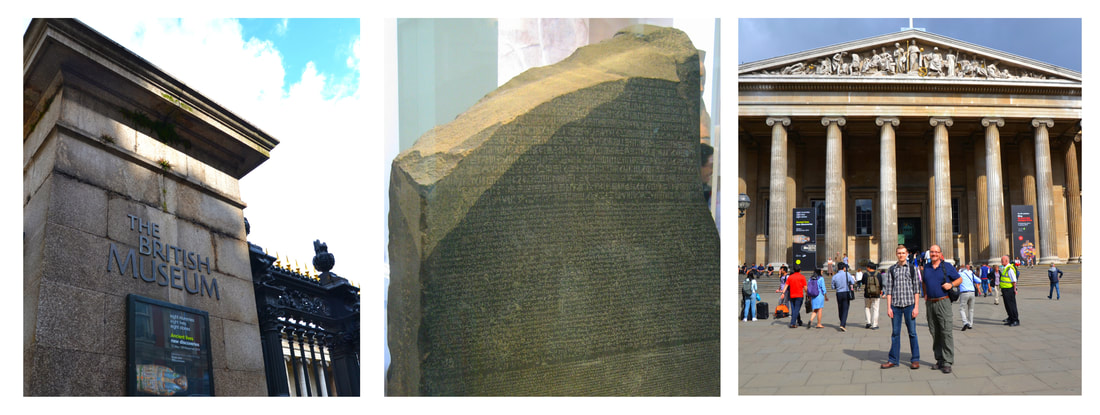|
The Rosetta Stone holds the key to understanding the ancient past. It's a hefty, grey slab from 2,200 years ago, engraved with three languages—hieroglyphs, Demotic Egyptian, and Ancient Greek. I was able to see the stone in London in 2014. As one of the most popular artifacts at the British Museum, naturally it was surrounded by crowds of excited tourists taking photos. We were all craning our necks to catch a glimpse of this seemingly uninteresting rock. Out of all the museum's artifacts, like colourful Roman and Greek mosaics (which are great by the way), towering Babylonian statues of winged bulls crowned with human heads, and sunken treasures of the Vikings, you have to wonder why this grey slab draws so much attention.
When I was in grade 7 we were studying ancient Egypt and for one of our assignments we had to write our name in hieroglyphs. We put so much effort into replicating those Egyptian symbols perfectly. It was fun because it felt like we were writing in a secret code. What we didn't know is that it was the Rosetta Stone that made this possible. For centuries no one knew how to read hieroglyphs. That knowledge had been forgotten. Egyptian written history, locked away in elaborate inscriptions on tombs and pottery shards, seemed forever lost to us. But that changed with Napoleon's military campaign in Egypt. In 1799 French soldiers were digging fortifications near the port city of Rosetta in the Nile Delta when they unearthed something rather heavy—a stone slab weighing roughly 1,680 lbs. They had accidentally discovered the Rosetta Stone. The world of ancient history can seem far away and even inaccessible. But it's closer than we think. Scholars were able to determine that the Rosetta Stone includes three copies of the same text, an ancient declaration of loyalty to Egypt's pharaoh. Since we already knew how to read the portion in Ancient Greek, suddenly we had the solution for deciphering hieroglyphs. The Rosetta Stone was the key that opened up to us the world of ancient Egypt. Novelist L. P. Hartley writes, "The past is a foreign country; they do things differently there." To me that's an exciting concept. It means the world of the past is alive and well, waiting to be uncovered. And there's always more out there to discover. This doesn't just apply to history. Just as the Rosetta Stone opens up the world of the past to us, fiction brings us into new worlds where we encounter both the familiar and the unexpected. Picking up a new a book is really a big moment. Worlds living just beyond our imaginations are all of a sudden flooded with light and life. When I think of the Rosetta Stone, I'm reminded how sometimes all it takes to break through into another world is finding the right key—or the right book.
Comments
|
David Raphael HilderJoin the conversation as we explore the best there is in fantasy, sci-fi, adventure, and of course, the classics Archives
December 2020
Categories
All
|

